Hungarian director Ildiko Enyedi’s On Body and Soul (Testrol es lelekrol) opens on a scene of cold. It’s beautiful, a winter forest landscape, deserted except for two deer: a huge stag and a small doe react to one another in the snow, a tentative interaction of eyes and noses, nothing more. There’s a tenderness to what we see, the vulnerability of the female set against the power of the antlered male, but also a sense of somehow icy withdrawal.
Enyedi is too subtle a director to treat this opening scene as a metaphor for what follows, the human dimension of her film, although its story is indeed of the tentative interactions between a man and a woman. And that sense of cold continues. Our feeling of withdrawal increases as her second scene proceeds: its setting is a slaughterhouse, cattle waiting, penned but not frightened – their eyes, again, enormously expressive. Then they are stunned with shocks of electricity, and the process of dismemberment begins: carcasses reduced to slabs of meat before our eyes, all accomplished mechanically, human involvement limited to the operation of machinery.
You emerge from it, soul scoured, in silence
It’s a remarkable, doubly alienating opening – remote beauty, immediate cruelty. We sense from its abattoir setting that this film is not going to be an optimistic one, our feelings somehow established by its penumbra of mood. One that is particularly East European, perhaps: Enyedi takes us close to desolation in On Body and Soul, although the darkness is not wilful, and it’s leavened by scenes of sparing bleak humour.
Her slaughterhouse protagonists are Endre (Geza Morcsanyi, a non-professional in his first screen role) and Maria (Alexandra Borbely). He is the company’s finance director, overseeing its operation from a professional but benevolent distance; the fact that one of his arms is paralysed somehow emphasises that. She is newly arrived, a quality inspector who grades the meat, a job that involves an exactness of reckoning that almost goes beyond the human.
And although never made specific, Maria is different, uneasy in human interaction and unable to appreciate humour or nuance: her blond beauty isn’t the only thing that recalls The Bridge’s Saga Norén. Maria inhabits a private world in which distinctions are absolute, very different from the one that surrounds her, where they are all too blurred. It’s a society where low-level corruption appears endemic, and may just be the fabric that keeps things together at all (any visit by officialdom to the abattoir invariably ends with a bag of choice cuts pressed into the hands of whoever may be signing off on the forms).
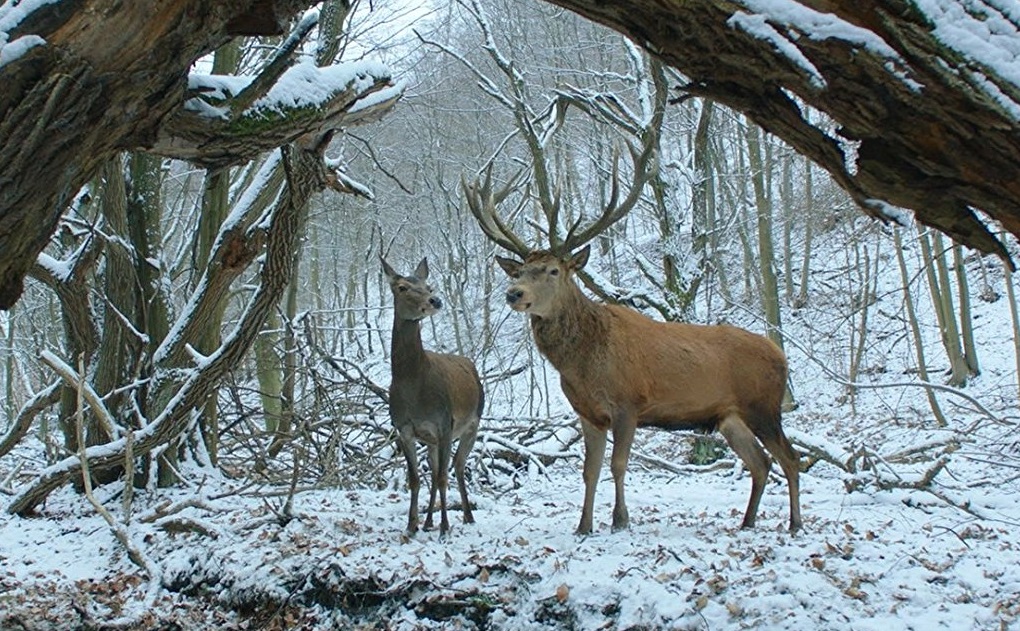 Enyedi is laconic about all of that, and there’s certainly no playing-for-laughs in her depiction of Maria. But, unlikely though it may seem, comedy is not far away. When a theft is discovered from the slaughterhouse veterinary store – bovine aphrodisiac of all things, why it is there at all a typical story – procedure dictates that a psychiatrist (Réka Tenki, very sassy) be brought in to interview staff. No subject is off-limits for her questioning, from earliest sexual experiences to last night’s dreams.
Enyedi is laconic about all of that, and there’s certainly no playing-for-laughs in her depiction of Maria. But, unlikely though it may seem, comedy is not far away. When a theft is discovered from the slaughterhouse veterinary store – bovine aphrodisiac of all things, why it is there at all a typical story – procedure dictates that a psychiatrist (Réka Tenki, very sassy) be brought in to interview staff. No subject is off-limits for her questioning, from earliest sexual experiences to last night’s dreams.
That ushers in the crucial development of Enyedi’s script, and puts the accompanying forest scenes in context: Endre and Maria, too tentative to express feelings to one another in life, are dreaming the same dreams, existing together in a parallel cervine night world (pictured above). That hackneyed line, “See you in my dreams”, becomes for them literally true.
The second half of On Body and Soul has the director negotiate the impact of that contact. Enyedi’s command of detail is exquisite, and best left to speak for itself. Suffice it to say that it can be both excruciating and curiously mundane. Moods move from the desperately comic – imagine Saga Norén forcing herself to feel anything, no matter whether it’s physical sensation or emotion – to the simply desperate, as we approach those iceberg expanses of desperate loneliness (the film’s closing track, Laura Marling’s “What He Wrote”, rings just right).
Ildiko Enyedi emerged on the cinema scene in 1989 with the hugely ambitious My Twentieth Century, for which she won the Camera d’Or prize for best first feature at Cannes that year. On Body and Soul is the first film she has made this century (she worked earlier this decade on the Hungarian version of HBO’s In Treatment, an experience which seems to have been in every sense therapeutic). On Body and Soul won the Golden Bear at this year’s Berlinale, its mood somehow in tune with the distinctive flavour of that festival. It would be an illusion to expect every viewer to be receptive to this remarkable film, but for those who are it sticks in the mind like a shard of broken glass, a jag of ice. You emerge from it, soul scoured, in silence.
Overleaf: watch the trailer for On Body and Soul






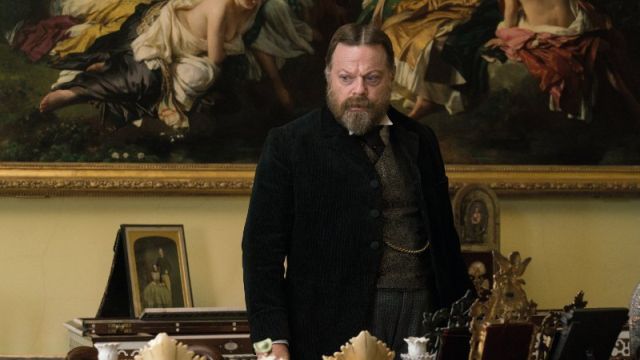 Britain's most beloved senior actress became a movie star, of course, on the back of Mrs Brown, which launched an Oscar-friendly film career. This Victoria redux finds the queen older and starchier and in need of the easy warmth and amity proffered by Abdul, a 24-year-old (and married) clerk who in 1887 gets dispatched from Agra to Britain to present Victoria with a newly-minuted mohur, or ceremonial gold coin.
Britain's most beloved senior actress became a movie star, of course, on the back of Mrs Brown, which launched an Oscar-friendly film career. This Victoria redux finds the queen older and starchier and in need of the easy warmth and amity proffered by Abdul, a 24-year-old (and married) clerk who in 1887 gets dispatched from Agra to Britain to present Victoria with a newly-minuted mohur, or ceremonial gold coin. 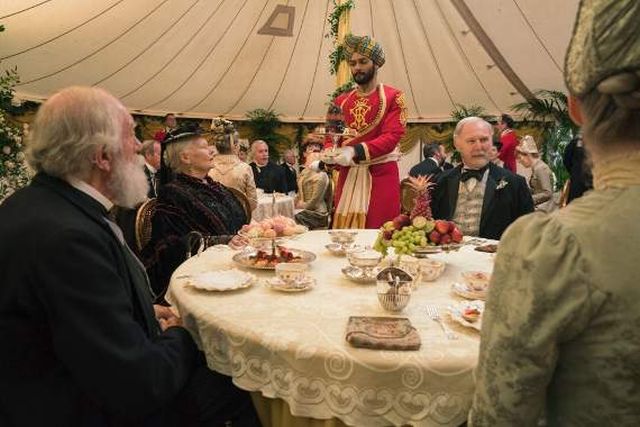 Elsewhere, the movie seems determined to be a sort of de facto "This is Your Life" for its star, who gets to revisit not just the queens she has assayed over time, Elizabeth 1 and Cleopatra included, but is given a jolly Room with a View-style jaunt to Florence. While there, she and Abdul encounter Simon Callow, no less, having a high old time as Puccini, and Dame J does her best to trill a phrase or two from Gilbert & Sullivan.
Elsewhere, the movie seems determined to be a sort of de facto "This is Your Life" for its star, who gets to revisit not just the queens she has assayed over time, Elizabeth 1 and Cleopatra included, but is given a jolly Room with a View-style jaunt to Florence. While there, she and Abdul encounter Simon Callow, no less, having a high old time as Puccini, and Dame J does her best to trill a phrase or two from Gilbert & Sullivan. 
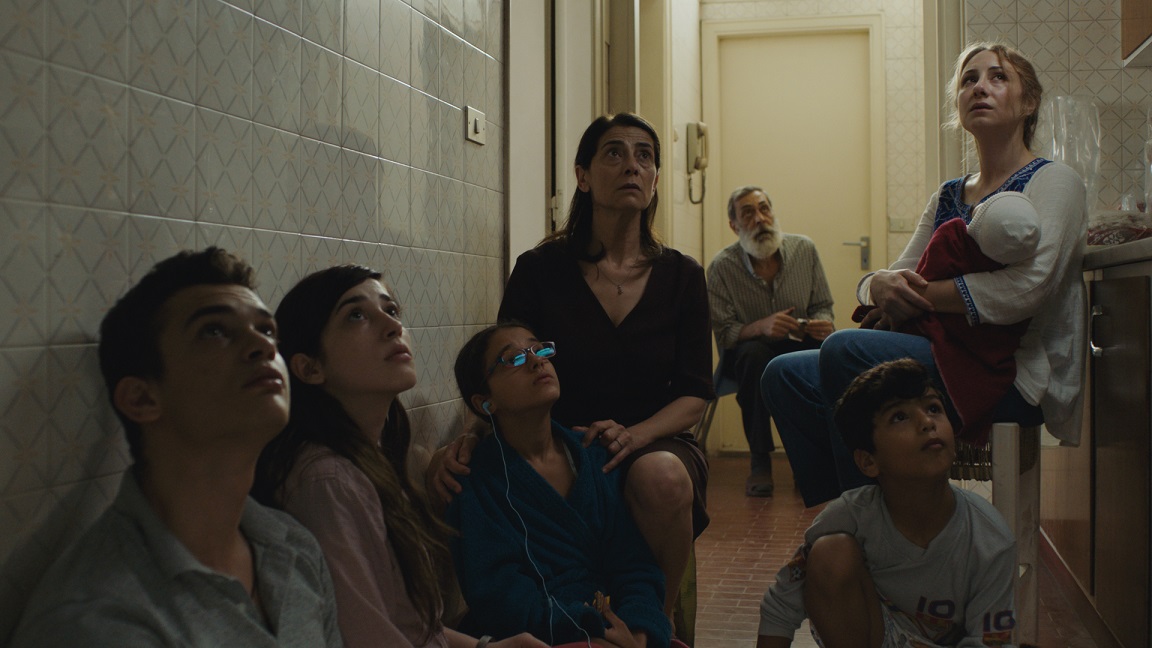 As the day starts, the rest of the family – two daughters, Yara and Aliya, and son Yazan – appears and interrelationships become clear. Halima and Samir are actually neighbours: their upstairs apartment damaged, they have been welcomed into this home. Another visitor is Kareem, Yara’s boyfriend, who had unwisely come to visit her and is now unable to return home until the situation outside calms down. The old man is Oum Yazan’s father-in-law Mustafa (Mohsen Abbas); her husband is expected back, but attempts to make contact with him prove fruitless.
As the day starts, the rest of the family – two daughters, Yara and Aliya, and son Yazan – appears and interrelationships become clear. Halima and Samir are actually neighbours: their upstairs apartment damaged, they have been welcomed into this home. Another visitor is Kareem, Yara’s boyfriend, who had unwisely come to visit her and is now unable to return home until the situation outside calms down. The old man is Oum Yazan’s father-in-law Mustafa (Mohsen Abbas); her husband is expected back, but attempts to make contact with him prove fruitless.

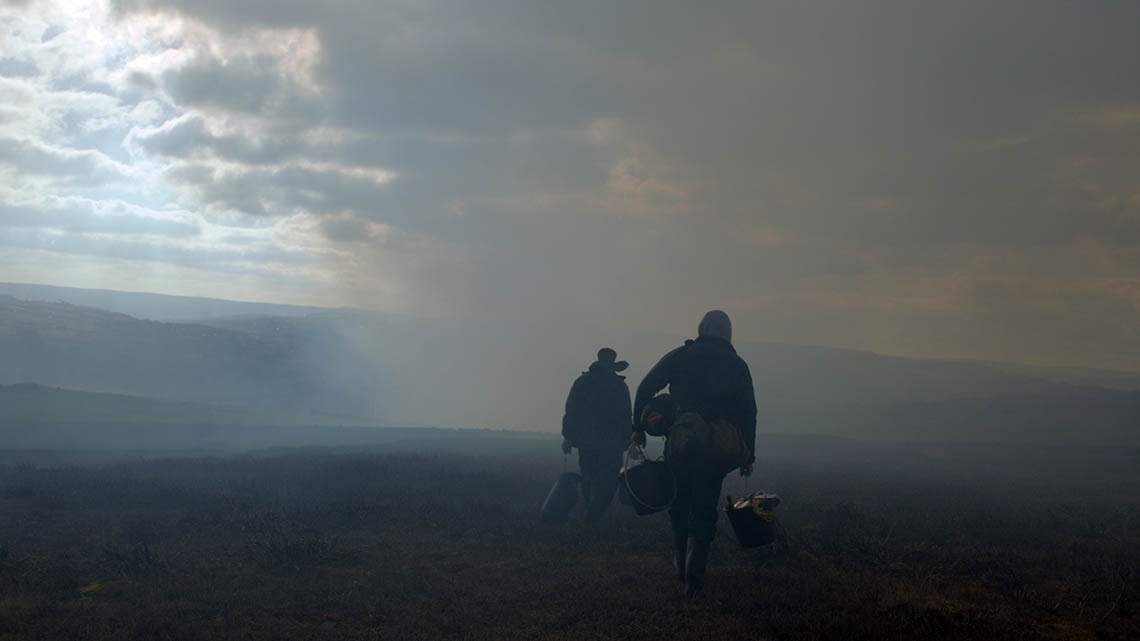 All of which makes the arrival of an outsider an unwelcome disruption. Gheorghe (Alec Secareanu) has come from Romania to help for a few weeks with the lambing – he was the only applicant for the job – and Johnny’s hostility is immediate as he taunts him as a “gyppo”. They are going up to the higher pastures for the lambing, to sleep in a ruined hut and subsist, it seems, entirely on pot noodles. Then up there, when least expected, fate stumbles in: in this stark isolation the hostility between the two men turns into something else, Johnny’s anger giving way to tussling, and that into physical contact. At first they fight in the mud, rutting like animals, before a deeper contact slowly grows between them. They may still guy one another, but their words – “freak”, “faggot” – are no longer insults, rather signifiers of an new, joshing intimacy.
All of which makes the arrival of an outsider an unwelcome disruption. Gheorghe (Alec Secareanu) has come from Romania to help for a few weeks with the lambing – he was the only applicant for the job – and Johnny’s hostility is immediate as he taunts him as a “gyppo”. They are going up to the higher pastures for the lambing, to sleep in a ruined hut and subsist, it seems, entirely on pot noodles. Then up there, when least expected, fate stumbles in: in this stark isolation the hostility between the two men turns into something else, Johnny’s anger giving way to tussling, and that into physical contact. At first they fight in the mud, rutting like animals, before a deeper contact slowly grows between them. They may still guy one another, but their words – “freak”, “faggot” – are no longer insults, rather signifiers of an new, joshing intimacy.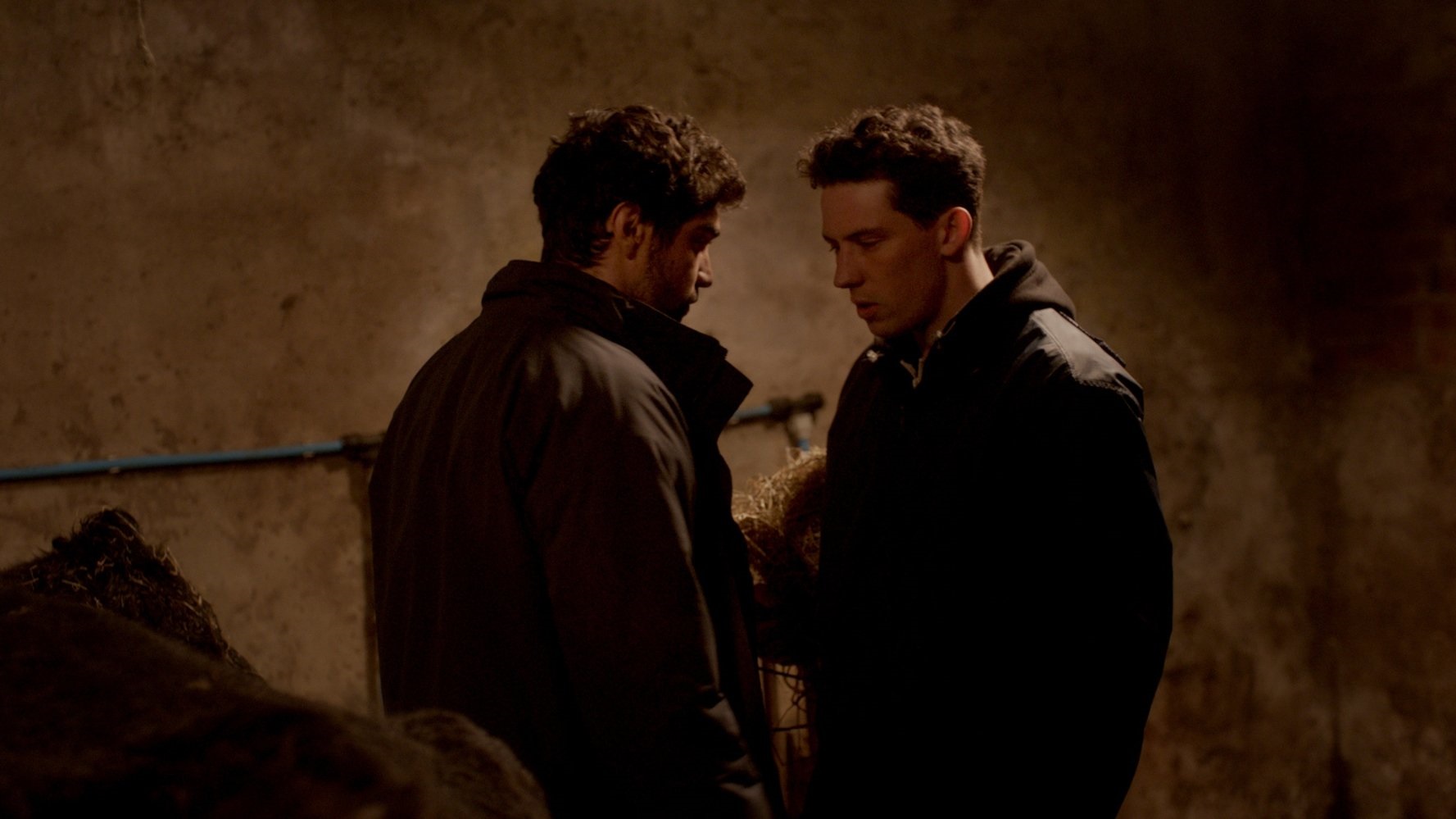 All of this is conveyed with such tenderness, expressed far more through images than in the very spare words of Lee’s script (his minimal use of music, principally tracks by A Winged Victory for the Sullen, is also all the more powerful for its sparseness). The sense of change feels somehow primal: simply, the two men come down from the hills different people. Johnny has started to feel things that he never knew he could, while for Gheorghe – everything we hear about his back story and homeland is unremittingly pessimistic, “My country is dead” – the possibility of settling, rather than wandering may have become real.
All of this is conveyed with such tenderness, expressed far more through images than in the very spare words of Lee’s script (his minimal use of music, principally tracks by A Winged Victory for the Sullen, is also all the more powerful for its sparseness). The sense of change feels somehow primal: simply, the two men come down from the hills different people. Johnny has started to feel things that he never knew he could, while for Gheorghe – everything we hear about his back story and homeland is unremittingly pessimistic, “My country is dead” – the possibility of settling, rather than wandering may have become real.
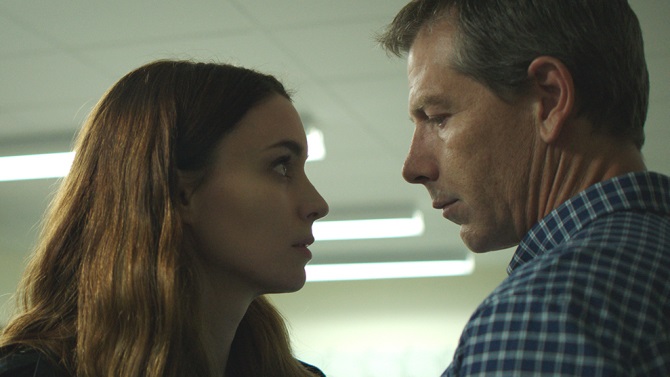 The crux of the central face-off remains. The adult Una is flicking one day through a trade magazine – quite why is never explained – when she sees a photo of the man, Ray (Ben Mendelsohn, a terrific actor who should be a bigger star than he is), who led her incipiently teenage self into an abusive, not to mention illegal relationship. Interestingly, the preyed-upon Una was 12 in the play, but perhaps adding a year to the character makes a difference in celluloid funding circles. (Rooney Mara, Ben Mendelsohn, pictured below)
The crux of the central face-off remains. The adult Una is flicking one day through a trade magazine – quite why is never explained – when she sees a photo of the man, Ray (Ben Mendelsohn, a terrific actor who should be a bigger star than he is), who led her incipiently teenage self into an abusive, not to mention illegal relationship. Interestingly, the preyed-upon Una was 12 in the play, but perhaps adding a year to the character makes a difference in celluloid funding circles. (Rooney Mara, Ben Mendelsohn, pictured below)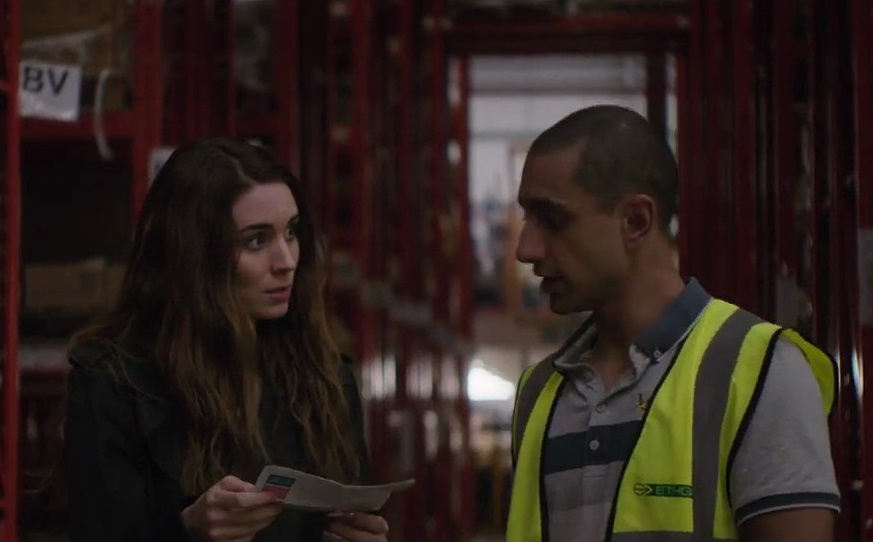 When Andrews and Harrower keep to the confines of the material’s essential dynamic, you see vestiges of the nascent power of the piece. Has Ray – who has done time in prison and started life anew with both a wife (Natasha Little) and a new name – put the past behind him? Has Una, and, indeed, can she? The precise reason for Una’s intrepid reacquaintance with Ray is itself properly elusive: vengeance per se doesn’t adequately describe what is afoot.
When Andrews and Harrower keep to the confines of the material’s essential dynamic, you see vestiges of the nascent power of the piece. Has Ray – who has done time in prison and started life anew with both a wife (Natasha Little) and a new name – put the past behind him? Has Una, and, indeed, can she? The precise reason for Una’s intrepid reacquaintance with Ray is itself properly elusive: vengeance per se doesn’t adequately describe what is afoot.
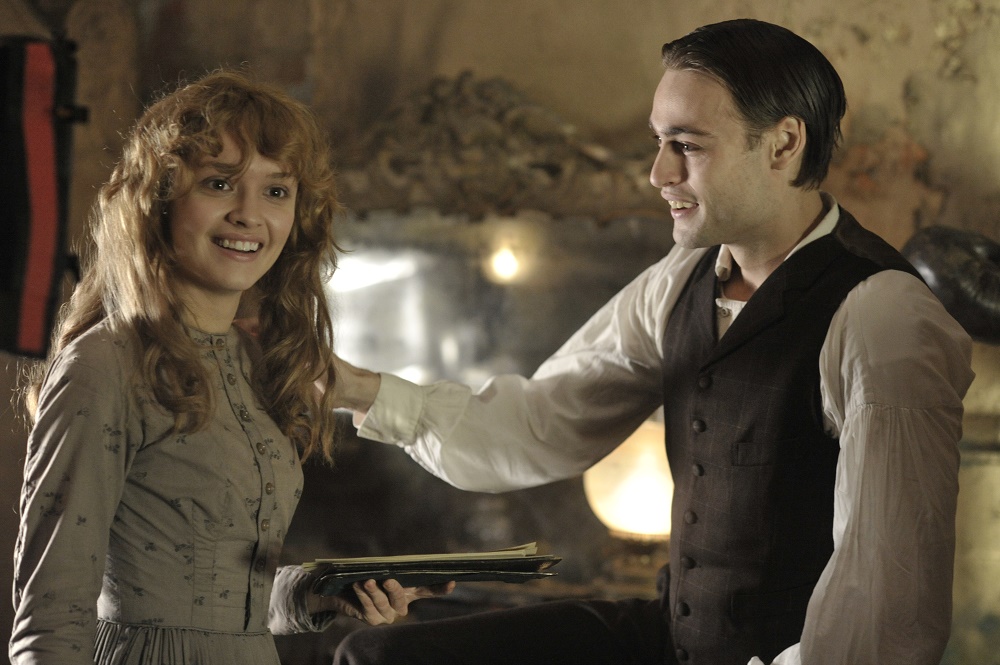 The accused is a demure little thing who, long before her husband’s death, was already in mourning for the termination of her career as an actress. A series of flashbacks establish that Lizzie has risen to gentility from the poorest circumstances. Her mother turned a blind eye to the molestations of randy old pervs. Orphaned, she drifts towards the local music hall, a place of magical enchantment staffed by dwarves and trapeze artistes, presided over by the celebrated cross-dressing Dan Leno (Douglas Booth, pictured above with Olivia Cooke) and his managerial sidekick known as Uncle (Eddie Marsan in a bald wig).
The accused is a demure little thing who, long before her husband’s death, was already in mourning for the termination of her career as an actress. A series of flashbacks establish that Lizzie has risen to gentility from the poorest circumstances. Her mother turned a blind eye to the molestations of randy old pervs. Orphaned, she drifts towards the local music hall, a place of magical enchantment staffed by dwarves and trapeze artistes, presided over by the celebrated cross-dressing Dan Leno (Douglas Booth, pictured above with Olivia Cooke) and his managerial sidekick known as Uncle (Eddie Marsan in a bald wig).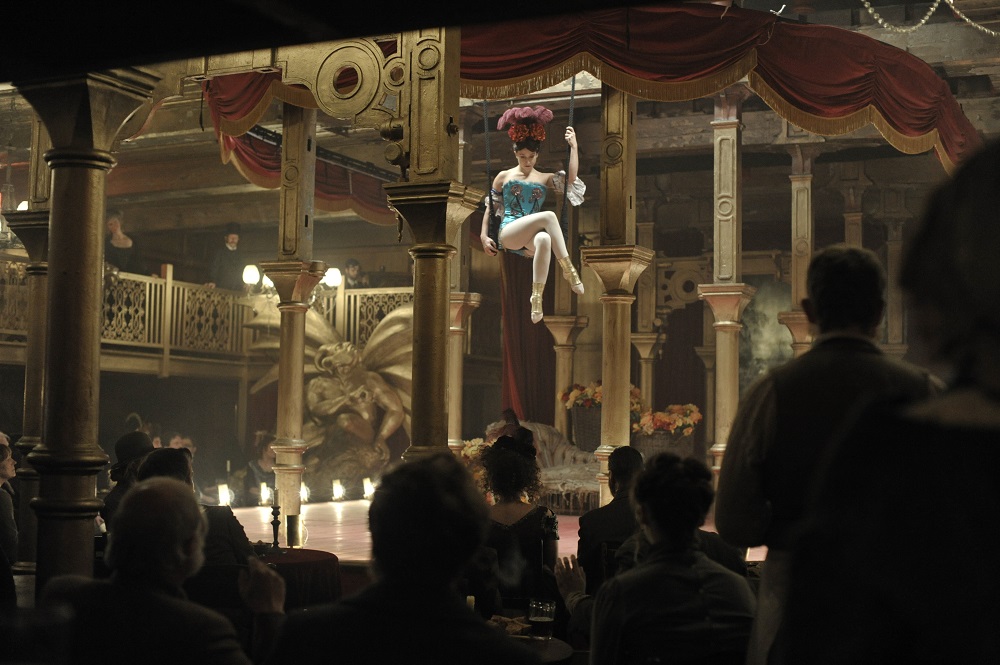 It’s curious to witness Bill Nighy play someone so intensely buttoned up (Kildare’s rumoured homosexuality goes for nothing). The role was originally destined for the late Alan Rickman, and it’s possible to imagine what he might have done with it. Nighy turns in a gimlet-eyed tribute performance which is shorn of all his trademark tics and tricks and doesn’t quite compute. As Leno, Booth channels his inner Russell Brand without conveying the hypnotic appeal that, you assume, was his signature. Daniel Mays plays a PC Plod turn he could do in his sleep. There’s a nice turn from María Valverde (pictured above) as a smouldering other woman.
It’s curious to witness Bill Nighy play someone so intensely buttoned up (Kildare’s rumoured homosexuality goes for nothing). The role was originally destined for the late Alan Rickman, and it’s possible to imagine what he might have done with it. Nighy turns in a gimlet-eyed tribute performance which is shorn of all his trademark tics and tricks and doesn’t quite compute. As Leno, Booth channels his inner Russell Brand without conveying the hypnotic appeal that, you assume, was his signature. Daniel Mays plays a PC Plod turn he could do in his sleep. There’s a nice turn from María Valverde (pictured above) as a smouldering other woman.